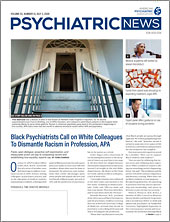On June 15, APA President Jeffrey Geller, M.D., M.P.H., hosted the first of a series of member town hall meetings to address structural racism in APA’s history, among colleagues, in psychiatric practice, and in the education of medical students and psychiatry residents. A distinguished panel of Black psychiatrists and a guest physician spoke to more than 500 APA members about what must be done to dismantle the processes and institutions that confer advantages upon white people and impede the lives and livelihoods of Black people, not only in APA and the profession of psychiatry, but in the nation as a whole.
Geller began with a
discussion of racism dating back nearly to the inception of American psychiatry. He described two alleged diseases theorized by nonpsychiatrist physician Samuel Cartwright in the mid-1800s:
drapetomania, the desire to flee from servitude, and
dysaesthesia aethiopica, a lack of work ethic.
“Cartwright’s theories were embraced in the slave states and mocked in the free states, including in medical journals,” Geller said. “APA was silent, and that is our shame. They were silent then, and we have been silent for 176 years.”
Danielle Hairston, M.D., president of the APA Caucus of Black Psychiatrists and the psychiatry residency training director at Howard University College of Medicine, stressed that racism in psychiatry is not a thing of the past and that it still plagues the profession.
“Please don’t say that you’re sorry for what Black people are going through right now. We’ve been going through this forever,” she said. “Systemic racism is etched in stone into every aspect of life in America, and medicine and psychiatry are not exceptions, but complicit.”
Hairston answered a question posed by a member, “How can we support Black residents and students?”
“You can start by validating that racism exists and validating their experiences. When a student or trainee is telling you something [racist] is happening, listen,” she said. “The revolution and the answer will not be cultural competency and diversity training. When there are no Black residents in your program, … do something about that. Do something to prioritize diversity, discuss sponsorship and mentorship, and invest in diversity as part of your recruitment.”
Walter E. Wilson Jr., M.D., M.H.A., a member of APA’s Council on Minority Mental Health and Health Disparities and a second-year fellow in child and adolescent psychiatry at Vanderbilt University, highlighted disparities in the criminal justice system and incarceration. He noted that although Black males make up 7% of the American population, they account for 37% of people who are incarcerated.
Wilson discussed how the image of Black men has been crafted in the United States, beginning with their arrival in North America in shackles, moving on to depictions of them as animalistic and hypersexualized in early 20th century novels and movies such as Birth of a Nation, and continuing today with their portrayal in the news as thugs and criminals.
Wilson spoke about the slogan “All Lives Matter” as a response to the Black Lives Matter movement. He described an analogy he had seen online.
“If you distill American society into one neighborhood, and each house represents a different racial or ethnic group, oftentimes African Americans end up asking for help throughout the community for emergencies associated with their house, and others respond with, ‘Well, all houses matter,’ ” he explained. “The problem with that is that the African American house is on fire. It has been on fire for 400 years. We were forced to live in a house that was smaller than the other houses, we were forced to be firefighters, and then we were blamed for the fire.”
Ayana Jordan, M.D., Ph.D., ECP trustee-at-large on the APA Board of Trustees and an assistant professor of psychiatry at Yale University School of Medicine, began her talk with a moment of silence for Black people who were killed by racially motivated acts of violence and police brutality. She expressed her grief over their deaths and described her distress over being unable to comfort her 10-year-old nephew, who, she said, is “experiencing extreme duress secondary to the belief that one day his mother—my older sister—or his father—my brother-in-law—might be the next victim of police murder.”
Directing her comments toward white psychiatrists, she emphasized that racism is something white people must actively address.
“This is not an issue for Black people, but rather an issue for our white brothers and sisters to reckon with,” she said. “Truly, if it were up to Black people, indigenous people, Latinx people, and other people of color, racism would have already been eradicated. So today I am speaking to my white brothers and sisters: You have to step up and do the work, and boy do you have a lot of work to do.
“I am asking that we as a member-led organization enter into a liberated space together. No, it’s not safe. Yes, you may get your feelings hurt,” she continued. “But as psychiatrists we understand that in conflict, often therein lies the work which can indeed yield growth. … At some point, you must wrestle with the truth that is deeply embedded in the foundation and roots of this organization and inherent in the practice of psychiatry: that of anti-Black racism.”
Thea James, M.D., an associate professor of emergency medicine at Boston Medical Center/Boston University School of Medicine, discussed disparities in health care and how they are rooted in disparities in other areas of life.
“Perpetual cycles of hospital admissions, ER visits, and poor health outcomes persist because they are just downstream consequences of root causes upstream like lack of income, unstable housing, and lack of access to healthy, affordable foods,” she said.
Geller announced that he had established the APA Presidential Task Force to Address Structural Racism Throughout Psychiatry. “The goal of this group is to create actions, not position statements, not white papers, but actions,” Geller said.
Cheryl D. Wills, M.D., an associate professor of psychiatry at Case Western Reserve University (Ohio) and APA Area 4 Board of Trustees member, is the chair of the task force. Also serving on the task force are the following:
•
Charles Dike, M.D., M.P.H.
•
Mary Jo Fitz-Gerald, M.D., M.B.A., APA Assembly Speaker-Elect*
•
Danielle Hairston, M.D., President of APA’s Black Psychiatrists Caucus
•
Sanya Virani, M.D., M.P.H.*
*Current member, APA Board of Trustees
An archived recording of the town hall can be accessed
here.





